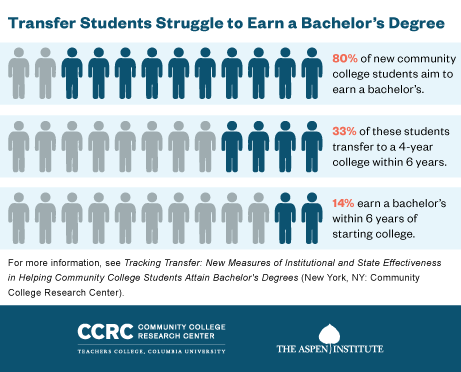Researchers Detail Highly Effective Practices to Help More Students Earn College Degrees
WASHINGTON, DC, May 17, 2016 — Recognizing the critical need to help millions of community college students failed by current transfer practices and policies, a new report released today provides a detailed guide for two- and four-year colleges on how to improve bachelor’s degree outcomes for students who start at community college. The full report, The Transfer Playbook: Essential Practices for Two- and Four-Year Colleges, from the Aspen Institute and the Community College Research Center (CCRC) at Teachers College, Columbia University, is available online at http://as.pn/transfer
“Helping more community college students successfully transfer and earn a bachelor’s degree is both one of the biggest challenges faced by American higher education and one of the most promising strategies for advancing economic opportunity and developing talent in this country,” said Josh Wyner, executive director at the Aspen Institute’s College Excellence Program and coauthor of the guide.
Every year, millions of students aiming to attain a bachelor’s degree attend community colleges because of their affordability and accessibility. Most will not realize their goals. While the vast majority of students report they want to earn a bachelor’s degree, only 14 percent of degree-seeking students achieve that goal within six years, according to recent research from CCRC, Aspen, and the National Student Clearinghouse Research Center. The odds are worse for low-income students, first-generation college students, and students of color—those most likely to start at a community college.

“We analyzed the practices at partnerships of community colleges and four-year institutions with high rates of transfer student success,” said Davis Jenkins, senior researcher at CCRC and coauthor of the report. “This report presents the evidence-based strategies that community college and university leaders can use to improve outcomes on their own campuses.”
Playbook Highlights
The Transfer Playbook is a practical guide for leaders at community colleges and four-year colleges about the essential, effective practices being used at colleges with strong transfer student outcomes, including:
- Leaders at two- and four-year colleges use data to monitor transfer student outcomes, build urgency among faculty and staff for improving transfer student success, and identify areas of improvement in existing transfer practice.
- Two- and four-year colleges collaborate to establish and regularly update major-specific program maps so that students, professors, and advisors have greater clarity about university requirements.
- Faculty and advisors at community colleges help students choose a major and preferred transfer destination early in their college careers.
- Faculty at two- and four-year institutions collaborate to ensure that instruction in lower-division courses at the community college is rigorous and aligned with the expectations of universities to which students are transferring.
- Leaders at both two- and four-year institutions make investments in supports that will improve transfer student outcomes and increase the economic returns for students and taxpayers.
The guide also includes:
- A step-by-step checklist on “How to Get Started” on improving transfer outcomes.
- A discussion of “next frontier” practices that even high-performing colleges and universities have just begun to explore.
- Concrete examples from six pairs of high-performing community colleges and four-year institutions selected based on their strong transfer student outcomes, using data from the National Student Clearinghouse.
| State | Community College | University Partners |
| Colorado | Front Range Community College | Colorado State University |
| Connecticut | Manchester Community College | Eastern Connecticut State University |
| Florida | Broward State College | Florida International University and Florida Atlantic University |
| Louisiana | Louisiana State University Eunice | University of Louisiana Lafayette |
| Massachusetts | Holyoke Community College | University of Massachusetts Amherst |
| Washington | Everett Community College | University of Washington and Western Washington University |
The guide follows the January 2016 state-by-state report Tracking Transfer, released by CCRC, the Aspen Institute, and the National Student Clearinghouse Research Center, which examined community college student outcomes in nearly every state in the country. Even in states with the best track records, only about one in five community college students transfer and graduate within six years of enrolling. In states at the bottom of the list, transfer and graduation rates are in the single digits.
“Far too often, community college students who want bachelor’s degrees fall through the cracks after trying to navigate the transfer labyrinth,” said Alison Kadlec, senior vice president at Public Agenda, whose organization is partnering with Aspen and CCRC in the next stages of transfer work. “Even if they do make the leap to a four-year college, they aren’t finding the support they need to succeed once they arrive. Two- and four-year colleges need to co-own responsibility of getting students to the finish line.”
Funded by Carnegie Corporation of New York, the Bill & Melinda Gates Foundation, and The Leona M. and Harry B. Helmsley Charitable Trust, the guide is the second phase in a major initiative to understand the causes of low community college transfer rates and to provide colleges with the tools they need to improve.
***
The Aspen Institute's College Excellence Program aims to advance higher education practices, policies, and leadership that significantly improve student outcomes. Through the Aspen Prize for Community College Excellence, the New College Leadership Project, and other initiatives, the College Excellence Program works to improve colleges’ understanding and capacity to teach and graduate students, especially the growing population of low-income and minority students on American campuses.
The Community College Research Center (CCRC), Teachers College, Columbia University, conducts research on the major issues affecting community colleges in the United States and contributes to the development of practice and policy that expands access to higher education and promotes success for all students.

